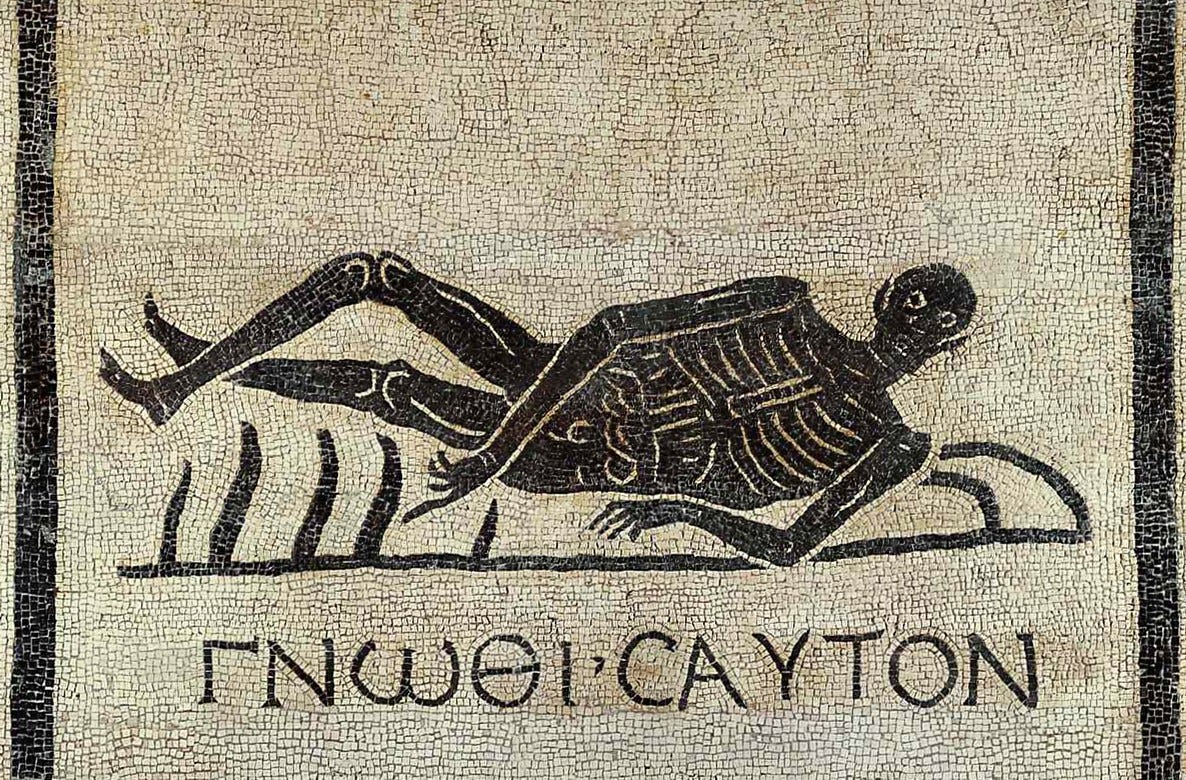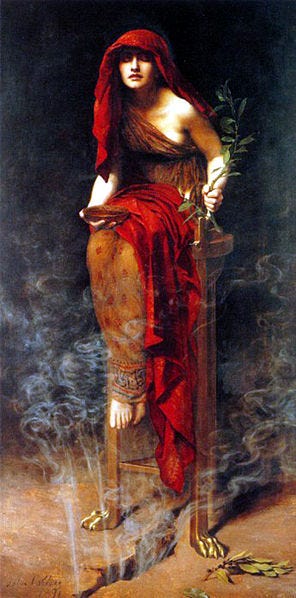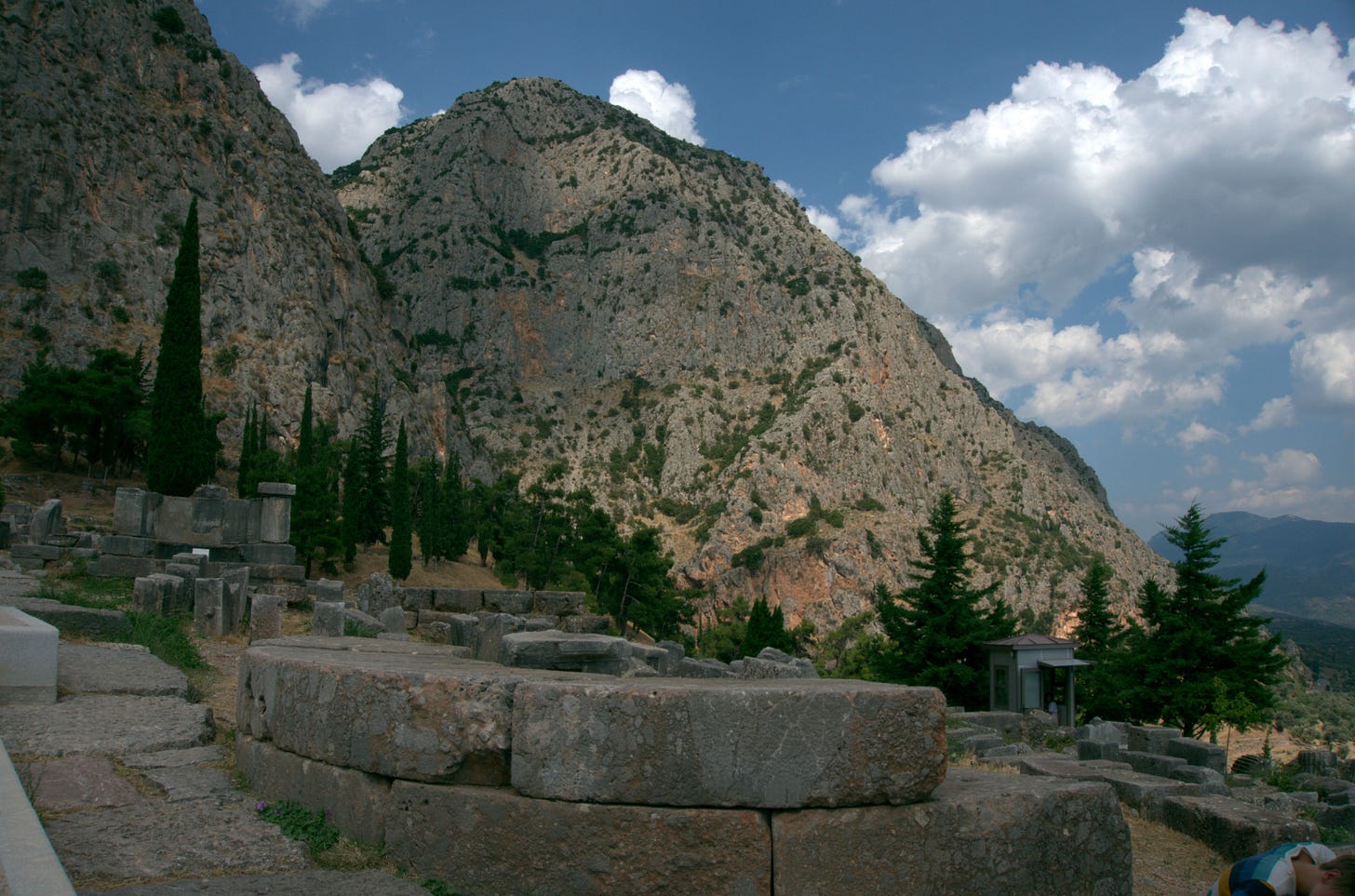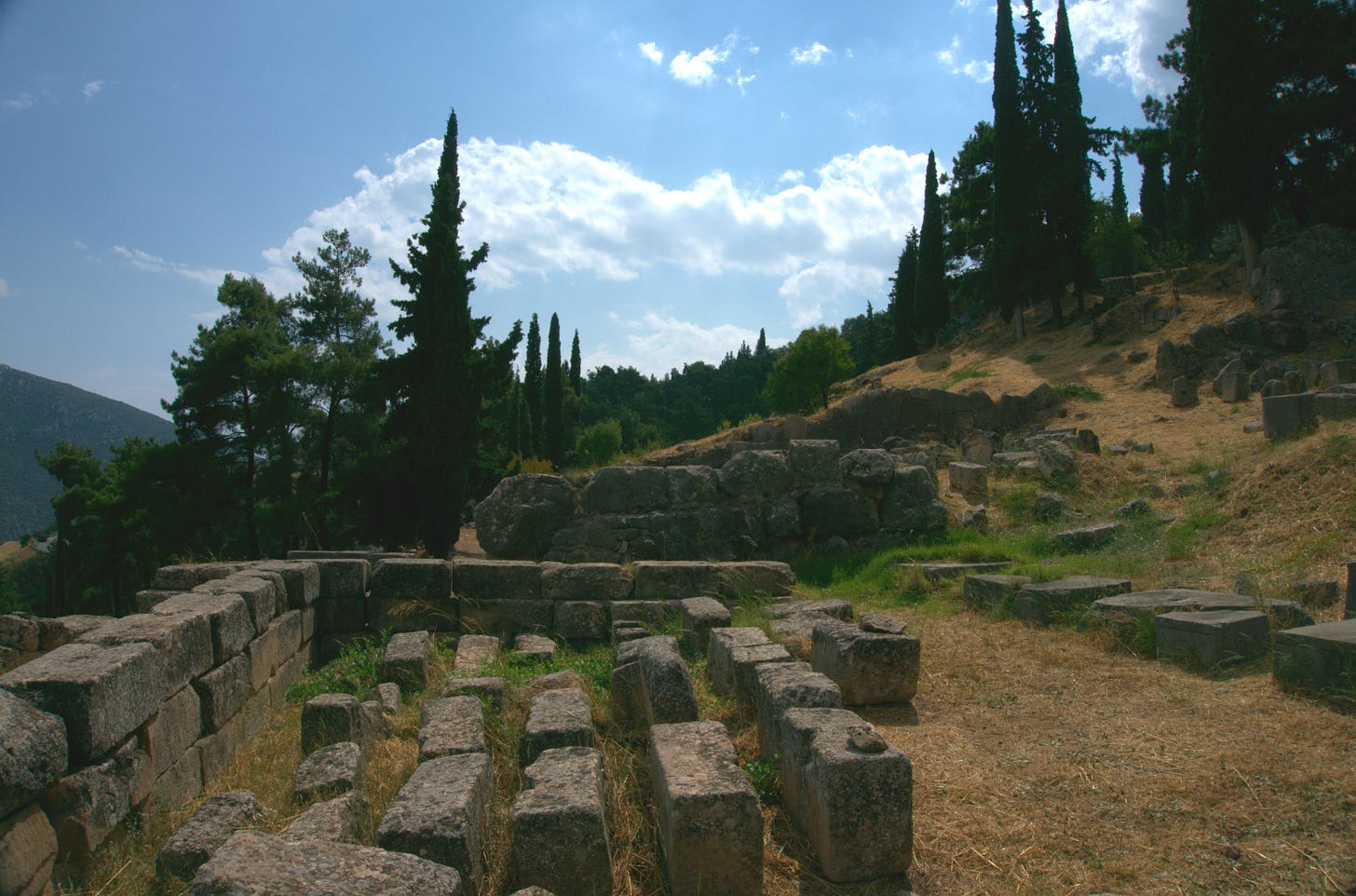
“Know Thyself”
Dear Classical Wisdom Readers,
From the Greek γνῶθι σεαυτόν to the Latin nosce te ipsum or temet nosce….
You probably recognize the saying “Know Thyself”… especially if you read these humble pages. After all, these two words have had a profound impact on history, philosophy and the development of wisdom itself.
Arguably the most famous of the 147 maxims inscribed on the Temple of Apollo, “Know thyself” is one of the moral rules given by the Greek god Apollo’s Oracle at Delphi, Pythia. They were attributed to Apollo, but this particular aphorism was also said to be conceived by the philosopher Thales or Phemonoe, a mythical Greek poet.
It could also just be an ancient proverb, its source lost to history’s ether.
No matter its origins, the inscription influenced Socrates, Plato, Aeschylus… to name a few greats from the ancient world.
The medieval and modern philosophers were also not immune; Aquinas, Hobbes, Pope, Rousseau, Emerson referenced the importance of knowing oneself.
Even the “Pliny of the North” and father of Modern Taxonomy, Carl Linnaeus, published the first edition of Systema Naturae in which he described humans (Homo) with the simple phrase “Nosce te ipsum”.
Great! We are all agreed then – we should know ourselves. But that’s just where the difficulty begins...
Founding father Benjamin Franklin, writing in his Poor Richard’s Almanack, observed just how tricky it is to accomplish this task:
“There are three Things extremely hard, Steel, a Diamond, and to know one’s self.”
So, let us see if together we can make some headway on the topic… to take a moment during our always busy lives to be truly reflective and think about one of the most important rules of the ancient world:
How can we know ourselves? What can we do to accomplish this? Is this a Maxim for Modern life?
As always, you can comment below to take part in the conversation..
As for the aforementioned Oracle of Delphi, for which the aphorism “know thyself” is most famed, you will be interested to discover more about the importance of the Pythia and life in Delphi in today’s article. As a ritual that lasted 12 (!) centuries, you can imagine its impact in the ancient world and onwards.
Enjoy reading it below and see you in the discussion!
All the best,
Anya Leonard
Founder and Director
Classical Wisdom
Classical Wisdom Members: Enjoy Professor Gill’s insights on the Stoic relationship to Nature and Happiness in our recent Podcast. Not a member? Join our growing community to discover ancient wisdom that can help in the here and now:
The Oracle of Delphi: More than a legend
By Mónica Correa, Contributing Writer, Classical Wisdom
Centuries ago, from every corner of the Mediterranean, people traveled to Greece to get answers about their life and future by the Oracle of Delphi. It was there that the god Apollo, through different women named Pythia chosen by local priests, sent his messages to those who needed them… as well as to those who could afford them. This was how it happened for the 12 centuries the oracle was active.
How was life at Delphi?
Delphi, along with Olympia and Nemea, was considered an inter-urban sanctuary but also a panHellenic sanctuary:
“they were located away from major cities, although they were under the administrative control of their nearby city-states or amphictyonies, they had an aura of neutrality”.
While at least four temples were built for Apollo at Delphi, there were many more around the ancient Mediterranean world. In fact, Delphi was not even the only ancient city with an oracle, however it was one of the most significant.
While the oracle was active, wealthy people and leaders from different territories occasionally paid to get to the front of the line to see the oracle. Indeed, there are records that state that the Pythia was sometimes forced to take her position on the tripod by the temple priests in order to satisfy rich clients.
At Delphi, there were always a lot of people waiting in line to see it. We know about them because the ones who paid a lot of money are immortalized in stone inscriptions.
Interestingly, these aren’t the only stone inscriptions… Despite wars, the rise and fall of different empires, two messages still survive to this day on the entrance of the temple: “Know thyself” and “Nothing too much”.
The Oracle and its messages
According to some records, the oracle delivered its pronouncements on an annual basis; the day chosen for the event was the seventh day of Bysios, Apollo’s birthday.
Other records state that nine times each year the woman went to the tripod, initiated the trance state, and gave Apollo a voice to deliver his messages. These sessions were held on the seventh day after each new moon in spring, summer, and fall. It did not occur during winter because Apollo was believed to have gone north to the land of the Hyperboreans (giants who lived “beyond the North Wind”).
The Pythia was always a woman from Delphi, regardless of her age or social class. While she was serving as oracle, she lived in the sanctuary, abstained from sexual activity, and fasted on or before the days scheduled for oracular sessions.
During days of oracle activity, the Pythia would initially be brought by priests of the temple from a private residence and led through a series of purification and religious rituals before her performance. Eventually she was led down into the inner sanctum of the temple (the adyton).
Rulers and wealthy citizens of the known world (as well as famous philosophers) made the journey to this mountainous site to make the most important decisions of their lives… and the lives of those around them. Indeed, war and peace were determined by these messages.
Unlock the Classics ~ Subscribe Today
The Vapors of Delphi
The Pythia delivered their oracles on a tripod over the cleft in the ground of Apollo’s temple, which was constructed around 800 BCE on Mount Parnassus. Over the years different women would take on the sacred role and pronounce their prophecies, but they were always inspired by the same vapors.
For centuries, different researchers underestimated the theory of the cleft and vapors because they couldn’t find any geological indicators that led them to their location. However, ancient writers such as Plutarch, Homer or Euripides described the vapors and modern studies are finally validating their reports. Evidence from a chemical analysis of water samples and travertine deposits in the adyton have shown that the springs on site have in the past and continue at present to emit small volumes of hydrocarbon gasses.
Fall of Delphi and its Oracle
The Oracle started its decline in late Hellenistic and early Roman times. In 389 CE, Theodosius I started persecutions against Old Religion and prohibited the cult of Apollo and the celebration of the Pythian games in honor of Apollo. In 391 CE, Christianity was the exclusive state religion and older temples were closed.
Even though temples were shut down and the oracle was “silenced”, splendid structures still stand today, preserving the magnificent, if not fantastic, history of the Pythia and the Oracle of Delphi:
Más info en https://ift.tt/8Xw0MFJ / Tfno. & WA 607725547 Centro MENADEL (Frasco Martín) Psicología Clínica y Tradicional en Mijas. #Menadel #Psicología #Clínica #Tradicional #MijasPueblo
*No suscribimos necesariamente las opiniones o artículos aquí compartidos. No todo es lo que parece.






No hay comentarios:
Publicar un comentario